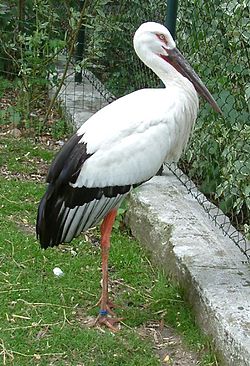鸛
| ||||||||
Translingual edit
| Traditional | 鸛 |
|---|---|
| Shinjitai (extended) | ⿰𮥶鳥 |
| Simplified | 鹳 |
Han character edit
鸛 (Kangxi radical 196, 鳥+18, 29 strokes, cangjie input 廿土竹日火 (TGHAF), four-corner 47227, composition ⿰雚鳥)
References edit
- Kangxi Dictionary: page 1504, character 39
- Dai Kanwa Jiten: character 47500
- Dae Jaweon: page 2034, character 11
- Hanyu Da Zidian (first edition): volume 7, page 4670, character 22
- Unihan data for U+9E1B
Chinese edit
| trad. | 鸛 | |
|---|---|---|
| simp. | 鹳 | |
| alternative forms | 雚 | |
Glyph origin edit
Phono-semantic compound (形聲/形声, OC *koːns) : phonetic 雚 (OC *koːns, “stork”) + semantic 鳥 (“bird”). Originally written 雚.
Pronunciation edit
Definitions edit
鸛
- stork
- crane (Grus japonensis)
- Used in 鵝鸛/鹅鹳 (éguàn).
Compounds edit
Japanese edit
| ⿰𮥶鳥 | |
| 鸛 |
Kanji edit
(uncommon “Hyōgai” kanji, kyūjitai kanji, shinjitai form ⿰𮥶鳥)
Readings edit
- Go-on: かん (kan)←くわん (kwan, historical)
- Kan-on: かん (kan)←くわん (kwan, historical)
- Kun: こうのとり (kōnotori, 鸛)←こふのとり (kofunotori, 鸛, historical)
Etymology 1 edit
| Kanji in this term |
|---|
| 鸛 |
| こうのとり Hyōgaiji |
| kun’yomi |
Compound of 鸛 (kō, “Oriental stork”, see below) + の (no, attributive particle) + 鳥 (tori, “bird”).
Pronunciation edit
- (Tokyo) こーのとり [kòónóꜜtòrì] (Nakadaka – [3])[1][2]
- (Tokyo) こーのとり [kóꜜònòtòrì] (Atamadaka – [1])[1][2]
- IPA(key): [ko̞ːno̞to̞ɾʲi]
Noun edit
鸛 or 鸛 • (kōnotori) ←こふのとり (kofunotori) or コフノトリ (kofunotori)?
- Oriental stork (Ciconia boyciana)
- Synonym: 鸛鶴 (kōzuru)
- (by extension) any stork
Usage notes edit
As with many terms that name organisms, this term is often spelled in katakana, especially in biological contexts (where katakana is customary), as コウノトリ.
Etymology 2 edit
| Kanji in this term |
|---|
| 鸛 |
| こう Hyōgaiji |
| kun’yomi |
/kan/ → /kau/ → /koː/
Pronunciation edit
Noun edit
鸛 or 鸛 • (kō) ←こふ (kofu) or コフ (kofu)?
As with many terms that name organisms, this term is often spelled in katakana, especially in biological contexts (where katakana is customary), as コウ.
Derived terms edit
- 鸛鶴 (kōzuru)
- 青嘴鸛 (aohashikō, “white-bellied stork (Ciconia abdimii)”)
- 朱嘴鸛 (akahashikō)
- 燕尾鸛 (enbikō, “maguari stork (Ciconia maguari)”)
- 鞍嘴鸛 (kurahashikō)
- 朱嘴鸛 (shubashikō, “white stork (Ciconia ciconia)”)
- 白襟鸛 (shiroerikō, “Asian woolly-necked stork (Ciconia episcopus)”)
- 朱鷺鸛 (tokikō)
- 鍋鸛 (nabekō, “black stork (Ciconia nigra)”)
- 禿鸛 (hagekō)
- 嘴広鸛 (hashibirokō, “shoebill (Balaeniceps rex)”)
References edit
- ↑ 1.0 1.1 NHK Broadcasting Culture Research Institute, editor (1998), NHK日本語発音アクセント辞典 [NHK Japanese Pronunciation Accent Dictionary] (in Japanese), Tōkyō: NHK Publishing, →ISBN
- ↑ 2.0 2.1 2.2 Matsumura, Akira, editor (2006), 大辞林 (in Japanese), Third edition, Tōkyō: Sanseidō, →ISBN
Korean edit
Hanja edit
鸛 • (gwan) (hangeul 관, revised gwan, McCune–Reischauer kwan, Yale kwan)
- crane (Grus japonensis)
- stork (Ciconia species)
Vietnamese edit
Han character edit
- This term needs a translation to English. Please help out and add a translation, then remove the text
{{rfdef}}.

